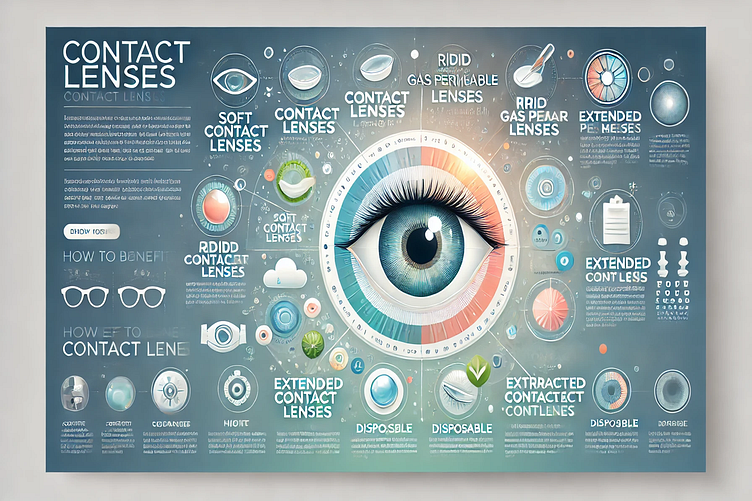Everything You Need to Know About Contact Lenses
This image is generated with the help of ChatGPT
Contact lenses have revolutionized the way people correct their vision. These small, curved lenses rest directly on the surface of your eyes and offer a convenient alternative to traditional eyeglasses. Whether you're new to the world of contact lenses or considering making the switch, here’s everything you need to know about them.
What Are Contact Lenses?
Contact lenses are thin, lightweight lenses made from various materials that correct vision problems like nearsightedness, farsightedness, astigmatism, and presbyopia. They are designed to float on the tear film that covers your cornea, providing a clear and natural field of vision.
Types of Contact Lenses
There are several types of contact lenses to suit different needs and preferences:
Soft Contact Lenses:
Made from flexible, water-absorbing materials, these lenses are comfortable and easy to adapt to.
Rigid Gas Permeable (RGP) Lenses:
These lenses are more durable and provide sharper vision, especially for those with astigmatism.
Extended Wear Lenses:
Designed for continuous wear, even while sleeping, these lenses can be worn for up to 30 days.
Disposable Lenses:
These lenses are replaced daily, weekly, or monthly, reducing the risk of infections and increasing convenience.
These special lenses are designed beyond visible spectrum so that it can detect what naked eyes can't see.
Benefits of Contact Lenses
Unobstructed Vision:
Contact lenses move with your eyes, providing a natural and wide field of vision without the frame obstruction that glasses have
Comfort and Convenience:
Many users find contact lenses more comfortable and convenient, especially during physical activities and sports.
Aesthetic Appeal:
Contact lenses do not alter your appearance, allowing you to show off your natural look.
Corrective Versatility:
Contact lenses can correct a wide range of vision problems and are available in various types to suit individual needs.
How to Care for Contact Lenses
Proper care and maintenance of contact lenses are essential to ensure eye health and lens longevity. Here are some basic tips:
Cleanliness:
Always wash your hands before handling lenses to avoid contamination.
Proper Cleaning:
Use the recommended cleaning solutions and follow the care instructions provided by your eye care professional.
Storage:
Store lenses in a clean, dry case with fresh solution.
Regular Replacement:
Follow the recommended replacement schedule to prevent infections and ensure optimal vision correction.
Conclusion
Contact lenses offer a convenient, comfortable, and effective way to correct vision. With various types available, you can find the perfect fit for your lifestyle and needs. If you're considering contact lenses, consult with your eye care professional to explore your options and experience the benefits they can provide.
